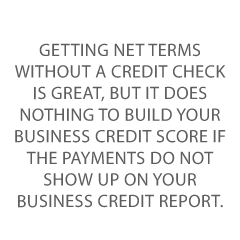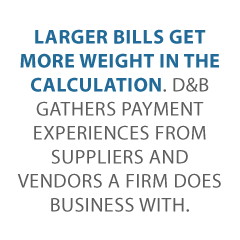There are Three Different Credit Bureaus – But What are the Real Differences Among Them?
What distinguishes the three different credit bureaus? And can you use that information to your advantage?
Business Credit Reporting Agencies
There are three different credit bureaus for business: Dun & Bradstreet, Experian, and Equifax. FICO SBSS and CreditSafe are also players.
In the business world Equifax and Experian are up there, but it’s Dun & Bradstreet which is the major player. In the consumer world the three main reporting agencies (TransUnion, Equifax, and Experian) have a similar number of consumer records. This has to do in large part with them splitting up the smaller reporting agencies between them over many decades.
But in the business world, D&B has more than 10 times the records of the next closest reporting agency. In the business credit world there really is one major player, with two other much smaller ones. See dnb.com/about-us/company.html. It makes sense to start with D&B when comparing the business CRAs, because you’ll have to start the business credit building process with them anyway.
Dun & Bradstreet
D&B is the oldest and largest credit reporting agency. Go to D&B’s website and look for your business, at dnb.com/duns-number. Can’t find it? Then get a free D-U-N-S number. You will always need a D-U-N-S number to start building business credit. Go here to get a D-U-N-S number: dnb.com/duns-number/get-a-duns.html.
D&B Scores
A D-U-N-S number is how D&B gets your company into their system. And a D-U-N-S number plus 3 payment experiences leads to a PAYDEX score. A payment experience is a record of a purchase from a business which reports to a credit reporting agency. In this case, D&B. Once you are in D&B’s system, search Equifax and Experian’s sites for your business. You can do so at creditsuite.com/reports.
D&B Reports
D&B offers database-generated reports. In general when D&B does not have all of the data they need, they will indicate as much in their reports. But missing data does not necessarily mean a company is a poor credit risk. Instead, the risk is unknown. To ensure as accurate a report as possible, give D&B your company’s current financial statements.
Dun & Bradstreet Scores
PAYDEX is probably the best-known D&B score. Some others are:
- D&B Rating
- Delinquency Predictor
- Financial Stress Score
- Supplier Evaluation Risk Rating
To look at a sample Business Information Report, go to products.dandb.com/download/2019_BIR-Snapshot-Report.pdf
PAYDEX Score
PAYDEX is Dun & Bradstreet’s dollar-weighted numerical rating of how a company has paid its bills over the past year. D&B bases this score on trade experiences which various vendors report. The score ranges from 1 to 100. Higher scores mean a better payment performance. PAYDEX scores reflect how well a company pays its bills.
What Influences Your PAYDEX Score?
Larger bills get more weight in the calculation. D&B gathers payment experiences from suppliers and vendors a firm does business with. Each experience reflects a different supplier and reflects how bills are met within relation to the terms granted. Up to 875 payment experiences are used to generate the PAYDEX Score. And up to 80 representative payment experiences are reported in your credit report.
PAYDEX Numbers
D&B has created risk categories to make it easier to translate a PAYDEX score into understandable risk groups:
- PAYDEX 80-100: Low risk of late payment
- PAYDEX 50-79: Moderate risk of late payment.
- and PAYDEX 0-49: High risk of late payment
D&B takes a proactive approach to notify you when a change in your PAYDEX score is bringing you closer to a different risk category
Improving Your PAYDEX Score
Addressing any problems head-on is a useful strategy. Hence if your business is regularly late with payments, then you should address issues of organization and perhaps time management. Since the score is dollar-weighted, you quite literally get more bang for your buck by paying your bigger bills first. And because it reflects trends, you can help out your business by starting a practice of paying on time and sticking with it.
D&B Business Information Reports
For a snapshot of your business’s financial health, the best report to get is probably a Business Information Report. Currently, it costs $139.99. You can get a Business Information Report on your own business or on a company you’re considering doing business with.
Along with a PAYDEX score, a D&B Business Information Report contains:
- Trade payments (summary and by industry)
- Trade line specifics with dollar amounts and terms
- Legal events
- Company events (mainly concerning ownership and management)
- A company family tree showing ownership specifics
Risk Assessment Summary
A Business Information Report also contains a Risk Assessment Summary. It shows:
- Maximum credit recommendation
- PAYDEX
- Delinquency Predictor percentile
- Financial Stress percentile
- Supplier Evaluation risk
Correcting Your D&B Credit Scores and Reports
Get your report from D&B at www.dnb.com/about-us/our-data.html. Update the relevant information if there are mistakes or the information is incomplete. At D&B, you can do this at: dnb.com/duns-number/view-update-company-credit-file.html.
Keep your business protected with our professional business credit monitoring.
Experian Business Credit
Experian is a whole other ballgame. While business credit is credit which in a business’s name, and it depends on how well a company can pay its bills, Experian uses both consumer and business credit information to gauge risk.
“By combining personal and commercial credit information in one report, Experian provides a complete picture of the creditworthiness of small businesses”
You Will Need to Get Set Up with Experian
Get a BIN (Business Identification Number) from Experian. Experian’s BizSource assigns a BIN.
Experian’s Blended Score
This is summary information on a business and its owner. For troubled businesses, blended scores dropped an average of 30% over the four quarters leading up to a “bad” event. 53% of the time, the first signs of credit problems were on the business credit reports. And 46% of the time, the first signs of credit problems were on the owner’s personal report. Blended scores have been found to outperform consumer or business alone by 10 – 20%.
Experian CreditScore SM Report
With this report, you get an Experian Business Credit Score (Intelliscore). It includes the Experian Financial Stability Risk Rating. It also has information on derogatories like judgments, tax liens, and bankruptcies. You can learn about any fictitious business name information in the file. As of the fourth quarter of 2020, this report costs $39.95.
Experian BizVerify Report
This is a more basic report but it has less in it. As of the fourth quarter of 2020, this report costs less than $20. It is Experian’s snapshot view of a business credit file. Use this report to verify if a new business is in their National Business Database.
This brief summary report provides any available information on a business’s registration information. This is even for businesses that have not yet established an Experian business credit score. This isn’t much of a monitoring product; it’s more to make sure a business is in Experian’s records.
Improving Your Company’s Experian Report
Make sure vendors are reporting your payments, and not just with Experian. Pay bills early or on time, in full. For Experian, historical behavior (payment history) = 5-10% of total score. Try to maintain your personal credit utilization at about 20 – 30% of your limits or less. Don’t close positive accounts even if you no longer use them. And try to avoid derogatories like liens.
Keep your business protected with our professional business credit monitoring.
Equifax
This company gets its data from:
- A data sharing agreement with the Small Business Exchange
- Net 30 type industry trade credit information from a wide variety of suppliers
- These suppliers provide products and services to businesses on an invoice basis
Equifax scores answer one basic question. How likely is a business to go severely delinquent in its payments? The score is an indication of whether a company is likely to make late payments.
Scores
Equifax has a few main scores:
- Small Business Credit Risk Score for Financial Services
- Small Business Credit Risk Score for Suppliers
- The Small Business Failure Risk Score
- Payment Trend
- Payment Index
Check out a sample Equifax business credit report at https://assets.equifax.com/assets/usis/small_business_sample_credit_report.pdf.
Equifax Business Risk Monitor for Small Business
You can get risk score alerts. You can learn about potential risk based on a significant negative change to any of four predictive risk scores. They are the Business Credit Risk Score, Payment Index, Business Failure Score, and Business Delinquency Score.
Currently, this online product is not available as Equifax upgrades its Member Center. See equifax.com/business/business-risk-monitor.
FICO SBSS (in brief)
A FICO SBSS score is different from other business credit agency scores. With other credit reports from business credit reporting agencies, you can get a copy of your credit report and know where you stand. But this is not so with the FICO SBSS. Also, it can differ from lender to lender. The SBA requires a FICO SBSS score of at least 150 to lend to a business.
CreditSafe (in brief)
Credit reporting agency CreditSafe has the biggest wholly owned database in the industry. They gather data from local, trusted partners and combine it with a scoring algorithm. CreditSafe administers a global network of leading commercial credit reference agencies. They have live data streams for over 70 countries but are less well known than the others. See: creditsafe.com/us/en/more/about/our-data.html.
Keep your business protected with our professional business credit monitoring.
How Long Data Stays on Your Reports at the Different Credit Bureaus
Per Experian Business, bankruptcies stay for 7 to 10 years. Chapter 13 bankruptcy rolls off your credit report 7 years from the filing date, while Chapter 7 bankruptcy stays for 10 years from the filing date. Trade data stays on for 36 months. Judgments, collections, and also tax liens stay on for 6 years and 9 months. UCC filings stay on for 5 years. See experian.com/small-business/how-long-credit-report. There are similar time frames for the different credit bureaus.
Disputing Issues with Your Credit Scores and Reports at the Different Credit Bureaus
None of the different business bureaus will change your scores without proof. They are also starting to accept more and more online disputes. Also include proofs of payment with it. These are documents like receipts and cancelled checks.
Fixing credit report errors also means you specifically spell out any charges you challenge. Make your dispute as crystal clear as possible. If you need to snail mail anything in, then use certified mail so that you will have proof that you sent in your dispute.
Correct Experian issues at: experian.com/small-business/business-credit-information. Also, you can correct Equifax issues at: equifax.com/small-business-faqs/#Dispute-FAQs.
With all the different credit bureaus, be specific about the concerns with your report. D&B wants you to go through their Customer Service. You can also go through D&B Customer Service to add payment experiences. D&B’s Customer Service contact number can be found at dandb.com/glossary/paydex.
Monitoring D&B Credit Scores and Reports
Business credit reports are not always perfectly correct. All of the major CRAs are committed to accuracy. But you won’t know there are errors unless you monitor your business credit reports.
For D&B only, you can monitor your reports via CreditMonitor. It currently costs $39/month. See dnb.com/products/small-business/credit-monitor.html.
Monitoring Experian Credit Scores and Reports
The costs of monitoring can add up fast. At Experian, your best (least expensive) bet would be a Business Credit Advantage. Subscription Plan. Also, it currently costs $189 per year. See sbcr.experian.com/pdp.aspx?pg=Sample&link.
Monitoring Equifax Credit Scores and Reports
At Equifax, you would use Equifax Complete. It currently costs $19.95 per month, after an offer of 30 days for $4.95. See equifax.com/equifax-complete/Equifax.
Monitoring Your Business Credit Scores and Reports
Add these all together for a year and it’s $468 for D&B, $189 for Experian, and $224.40 for Equifax (with the special). For a grand total of $881.40!
Monitoring Your D&B, Experian, and Equifax Credit Scores and Reports
You can monitor your business credit at D&B, Equifax, and Experian through Credit Suite, for considerable savings over what it would cost you at those different credit bureaus. Also, it’s all in one place! Credit Suite offers monitoring through the Business Finance Suite (through Nav). See what credit issuers and lenders see so you can directly improve your scores and get the business credit and funding you need. See suitelogin.com and creditsuite.com/monitoring.
The Three Different Credit Bureaus: Takeaways
The different credit bureaus are similar but not identical. D&B is the largest and a D-U-N-S number is an absolute necessity for business credit building. Experian gets some of its scoring from your personal credit habits. Equifax gets much of its data from the Small Business Financial Exchange. CreditSafe and the FICO SBSS are also players in this space.
Monitoring all this is expensive. But you can save 90% by monitoring your D&B, Experian, and Equifax scores through Credit Suite.
The post What Makes the 3 Different Credit Bureaus Unique appeared first on Credit Suite.






